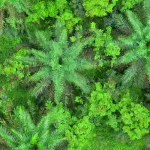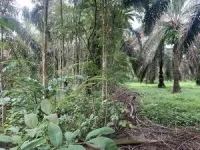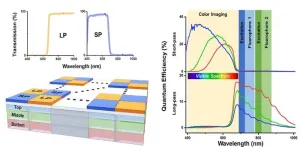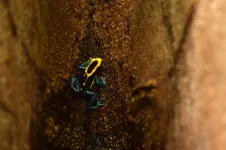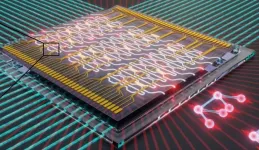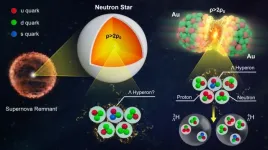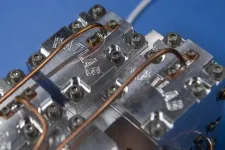(Press-News.org) Islands of trees in oil palm plantations can significantly increase biodiversity within five years without reducing productivity. This has been shown by an experiment, which has been running for over ten years in Indonesia as part of the Collaborative Research Centre (CRC) "EFForTS" at the University of Göttingen. An international team of researchers led by Göttingen planted experimental islands of trees in plantations on the island of Sumatra to counteract the species loss caused by the intensive cultivation of oil palms. The results have been published in the journal Nature.
The conversion of tropical forests into oil palm plantations leads to considerable losses of biodiversity and ecological functions. Worldwide, a total of about 21 million hectares of palm oil plantations are cultivated, mainly in Indonesia and Malaysia. To mitigate the negative impact on the environment, the scientists established 52 tree islands with local tree species in an industrial oil palm plantation. This has turned out to be a promising strategy for ecological restoration.
The research team had expected yields to deteriorate over time as the tree islands consumed resources for their own development at the expense of the oil palms. "However, even after five years after the experiment began, the oil palms have continued to flourish. And this has been accomplished without the use of artificial fertiliser in the tree islands," explains first author Professor Delphine Clara Zemp, now at the University of Neuchâtel. "Our results show that the industry can benefit from this intervention. There is real potential to develop these methods to enrich biodiversity on a large scale."
"Most studies of the ecology of palm oil plantations are limited to observing the loss of biodiversity and deterioration of the ecosystem," explains co-author Professor Holger Kreft, Head of Göttingen University’s Biodiversity, Macroecology and Biogeography Research Group. "Our approach to ecological restoration goes a step further and is unique worldwide, as it takes place against the backdrop of industrial-scale oil palm plantations across large areas. Using a rigorous experimental design, we can determine the optimal composition and size of islands of trees that will bring about the best possible way to restore the ecology."
The researchers analysed the biodiversity of soil microorganisms (such as bacteria or fungi), insects and other small invertebrates, plants, birds and bats three to five years after establishing the experiment. They also quantified the impacts in terms of water, carbon and nutrient cycle regulation, microclimate, soil quality, pollination and control of biological communities and invasive species. Close cooperation with the owners of the plantation was essential for the smooth running of the research project. "The collaboration helped us to better understand issues relating to the agricultural and economic management of the plantation and how our experimental trials affect oil palm yields. These aspects are crucial for the industry," says Zemp.
However, the 40 authors of the study agreed that the top priority must continue to be the prevention of deforestation: "The encouraging results must not be allowed to jeopardise the conservation of tropical forests, which are home to irreplaceable biodiversity," the team concludes.
The Collaborative Research Centre "Ecological and Socio-economic Functions of Tropical Lowland Rainforest Transformation Systems (EFForTS)" is funded by the German Research Foundation (DFG). Further information can be found here: www.uni-goettingen.de/efforts. Contributions to this paper are from researchers around the world including those at the Institut Pertanian Bogor and Jambi University in Indonesia, the universities of Neuchâtel in Switzerland, Hohenheim in Germany, and the German Centre for Integrative Biodiversity Research (iDiv) Halle-Jena-Leipzig.
Original publication: Delphine Clara Zemp et al. Tree islands enhance biodiversity and functioning in oil palm landscapes. Nature 2023. https://doi.org/10.1038/s41586-023-06086-5.
Contact:
Professor Holger Kreft
University of Göttingen
Biodiversity, Macroecology and Biogeography Research Group
Tel: +49 (0)551 39-28757
Email: hkreft@uni-goettingen.de
www.uni-goettingen.de/de/128741.html
END
Tree islands bring biodiversity to oil palm plantations
International research team led by Göttingen University shows method increases biodiversity without affecting yield
2023-05-26
ELSE PRESS RELEASES FROM THIS DATE:
Innovative endoscopic imaging system can detect multiple fluorescent tracers
2023-05-26
For patients with solid cancers, endoscopic surgery is one of the primary treatment options to remove tumors. However, there is a high risk of cancer recurrence if even a small number of cancerous cells are left behind after surgical resection. To prevent this from happening, researchers developed fluorescence-guided surgery (FGS). In FGS, patients are injected with a fluorescent probe that preferentially binds to tumor cells, enabling surgeons to easily identify lesions with the help of specialized endoscopes that emit the necessary excitation light.
Unfortunately, tumors can be highly heterogeneous, ...
CHOP researchers show that IgA fine tunes the body’s interactions with microbes
2023-05-26
Philadelphia, May 26, 2023—IgA deficiency is the most common primary immune deficiency worldwide, but its presentation has puzzled physcians and researchers. Some with the disorder present with symptoms like recurrent infections, autoimmune disease, or allergies, whereas others have no symptoms at all and only become aware of their IgA-deficient status through an incidental finding on a blood test. This variability has raised the question among researchers: Why aren’t many of those with IgA deficiency sicker?
A new study by researchers at Children’s ...
Protein-based nano-‘computer’ evolves in ability to influence cell behavior
2023-05-26
HERSHEY, Pa. — The first protein-based nano-computing agent that functions as a circuit has been created by Penn State researchers. The milestone puts them one step closer to developing next-generation cell-based therapies to treat diseases like diabetes and cancer.
Traditional synthetic biology approaches for cell-based therapies, such as ones that destroy cancer cells or encourage tissue regeneration after injury, rely on the expression or suppression of proteins that produce a desired action within a cell. This approach can take time (for proteins ...
Gene therapy rescues hearing for the first time in aged mouse models
2023-05-26
By 2050, one in 10 individuals are expected to live with some form of hearing loss. Of the hundreds of millions of cases of hearing loss affecting individuals worldwide, genetic hearing loss is often the most difficult to treat. While hearing aids and cochlear implants offer limited relief, no available treatment can reverse or prevent this group of genetic conditions, prompting scientists to evaluate gene therapies for alternative solutions.
One of the most promising tools used in these therapies—adeno associated virus (AAV) vectors—has galvanized the hearing-loss community in recent years. ...
The mechanisms behind swallowing
2023-05-26
Sensory cells in the vagus nerve can detect and locate food in the esophagus. Their signals help transport the food onward to the stomach. Signal failure leads to swallowing disorders, say a team led by Carmen Birchmeier at the Max Delbrück Center. They have published their findings in “Neuron.”
Swallowing disorders can have many causes, and they occur more frequently in older people. But neurological diseases such as multiple sclerosis and Parkinson’s disease, and certain medications, can also prevent food moving normally from mouth to stomach. Possible consequences include malnutrition, weight loss, and dehydration.
Now a team led ...
Life through rose-coloured glasses
2023-05-26
Over thousands of years some animals have specialised to live in environments where the sun never shines: giant squid with eyes the size of volleyballs see even in the darkest depths while others, like cave-dwelling olms, have lost the functionality of their eyes completely. But for animals that do not live in these extremes, how do species manage a world that suddenly becomes dark? Lakes that become turbid from algal blooms, agricultural run-off, or other environmental pollutants represent common examples of environmental disturbances that can impact the visual scene that ...
Promising building blocks for photonic quantum simulators
2023-05-26
Researchers at the Niels Bohr Institute have, collaborating with the University of Münster and Ruhr-Universität Bochum, developed new technology capable of processing the enormous amounts of information quantum systems generate. Deterministic single photon light sources, creating quantum bits at extreme rates and speed are now coupled to specially designed, integrated photonic circuits, capable of processing quantum information with adequate speed and quality without degrading the susceptible quantum states. This means that the first steps have been taken towards the development of photonic quantum devices that can, for example, ...
First measurements of hypernuclei flow at RHIC
2023-05-26
UPTON, NY—Physicists studying particle collisions at the Relativistic Heavy Ion Collider (RHIC) have published the first observation of directed flow of hypernuclei. These short-lived, rare nuclei contain at least one “hyperon” in addition to ordinary protons and neutrons. Hyperons contain at least one “strange” quark in place of one of the up or down quarks that make up ordinary nucleons (the collective name for protons and neutrons). Such strange matter is thought to be abundant in the hearts of neutron stars, which are among the densest, most exotic objects in the universe. While blasting off to neutron stars to study ...
When the cell digests itself: How inherited neurodegenerative diseases develop
2023-05-26
FRANKFURT. A tangle of pockets, tubes and sac-like membrane structures runs through the cells of humans, animals, plants and fungi: the endoplasmic reticulum, or ER for short. In the ER, proteins are manufactured, folded into their three-dimensional structure and modified, lipids and hormones are produced and calcium concentrations in the cell are controlled. In addition, the ER forms the basis for the cellular transport system, feeds misfolded proteins to intracellular disposal and renders toxins that have entered the cell harmless.
In ...
Army funds two quantum-related projects at Pitt
2023-05-26
The U.S. Army has awarded more than $5.7 million for two projects led by Michael Hatridge, associate professor of physics and astronomy in the Kenneth P. Dietrich School of Arts and Sciences. Both projects bring together a diverse group of researchers to overcome roadblocks in the field of quantum computing.
A four-year, $2.67 million grant is aimed at the next generation of modular quantum computing systems. Hatridge and co-principal investigators Robert Schoelkopf of Yale University have each developed unique ...
LAST 30 PRESS RELEASES:
$3 million NIH grant funds national study of Medicare Advantage’s benefit expansion into social supports
Amplified Sciences achieves CAP accreditation for cutting-edge diagnostic lab
Fred Hutch announces 12 recipients of the annual Harold M. Weintraub Graduate Student Award
Native forest litter helps rebuild soil life in post-mining landscapes
Mountain soils in arid regions may emit more greenhouse gas as climate shifts, new study finds
Pairing biochar with other soil amendments could unlock stronger gains in soil health
Why do we get a skip in our step when we’re happy? Thank dopamine
UC Irvine scientists uncover cellular mechanism behind muscle repair
Platform to map living brain noninvasively takes next big step
Stress-testing the Cascadia Subduction Zone reveals variability that could impact how earthquakes spread
We may be underestimating the true carbon cost of northern wildfires
Blood test predicts which bladder cancer patients may safely skip surgery
Kennesaw State's Vijay Anand honored as National Academy of Inventors Senior Member
Recovery from whaling reveals the role of age in Humpback reproduction
Can the canny tick help prevent disease like MS and cancer?
Newcomer children show lower rates of emergency department use for non‑urgent conditions, study finds
Cognitive and neuropsychiatric function in former American football players
From trash to climate tech: rubber gloves find new life as carbon capturers materials
A step towards needed treatments for hantaviruses in new molecular map
Boys are more motivated, while girls are more compassionate?
Study identifies opposing roles for IL6 and IL6R in long-term mortality
AI accurately spots medical disorder from privacy-conscious hand images
Transient Pauli blocking for broadband ultrafast optical switching
Political polarization can spur CO2 emissions, stymie climate action
Researchers develop new strategy for improving inverted perovskite solar cells
Yes! The role of YAP and CTGF as potential therapeutic targets for preventing severe liver disease
Pancreatic cancer may begin hiding from the immune system earlier than we thought
Robotic wing inspired by nature delivers leap in underwater stability
A clinical reveals that aniridia causes a progressive loss of corneal sensitivity
Fossil amber reveals the secret lives of Cretaceous ants
[Press-News.org] Tree islands bring biodiversity to oil palm plantationsInternational research team led by Göttingen University shows method increases biodiversity without affecting yield
